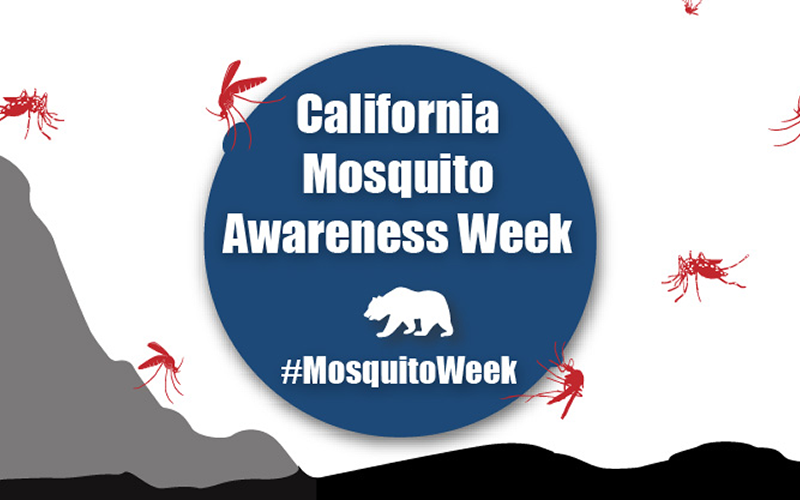VENTURA, California – Mosquito Awareness Week is April 16-22, and it is a reminder that it is more important than ever to eliminate standing water from your property. This year, the very active rainy season has left us with an abundance of mosquito breeding sites, from large flooded low-lying areas to small back yard sources.
In addition to native mosquito species, some of which can transmit West Nile Virus (WNV), the invasive Aedes aegypti mosquito has become established and is spreading in many areas of Ventura County. These small aggressive mosquitoes are day-biting, can breed in as little as a teaspoon of water, and have evolved to survive and thrive in and around our homes. Aedes aegypti mosquitoes have the potential to transmit several viruses, including dengue, chikungunya, Zika, and yellow fever. These viruses are not currently known to be transmitted within California, but now that these mosquitoes are present, an infected traveler returning to our area could be a source of local transmission.
The most effective means of controlling mosquitoes is to prevent their eggs and larvae from developing in water. Mosquito eggs are often deposited just above the level of standing water and may remain viable for a year or more, so objects that can hold water should be discarded, altered, or stored in a way to prevent water from collecting, or drained and scrubbed to remove eggs weekly.
Assistance from the community is required to help eliminate all conditions that allow mosquitoes to develop:
- Maintain or drain your swimming pool and spa.
- Stock ornamental water features with mosquito fish.
- Remove all objects in your yard or patio such as children’s toys, tires, bottles, and cans that may catch and hold water for more than a week.
- Cover yard drains with highly permeable irrigation cloth and clear outlets of debris to eliminate standing water.
- Remove saucers under potted plants or fill them with sand.
- Change the water in pet dishes, birdbaths, and other small containers weekly.
- Mosquito-proof your rain barrels with tightly fitting lids and cover all openings with two layers of tight mesh screen.
- Homeowners are also encouraged to adjust irrigation timers and watering practices to prevent excessive runoff and accumulation.
Residents can further reduce the chances of being bitten by mosquitoes by taking the following precautions. Make sure doors and windows have tight-fitting screens; when outdoors, wear loose, protective clothing such as long sleeve shirts, long pants, socks, and shoes when mosquitoes are most active and apply an EPA approved insect repellent, https://www.cdc.gov/mosquitoes/mosquito-bites/prevent-mosquito-bites.html
The Environmental Health Division (Division) monitors and controls mosquitoes at approximately 1,800 mosquito breeding sources throughout Ventura County. The Division is asking the public to assist with the mosquito control effort by reporting mosquito activity and potential mosquito breeding sites. Call the Mosquito complaint HOTLINE at 805/658-4310 or go to https://eco.vcrma.org/ to file a report online.
Mosquito-eating fish are available to the public for use in ornamental ponds and water features. To request mosquito-eating fish, call 805/662-6582. To report dead birds for WNV testing, contact the California Department of Public Health at 877/WNV-Bird (877/968-2473) or visit https://westnile.ca.gov.
For additional information, visit: https://vcrma.org/vector-control-program








